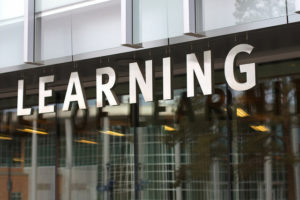
flickr photo by cogdogblog shared under a Creative Commons (BY) license
Learning technology is an exciting and fast moving field.
Whether you’re an academic interested in increasing engagement in lectures or a student looking for ways to improve your approach to studying, the development of your digital capabilities will be increasingly instrumental to your success.
Learning Technology
What are learning technologies and how do we learn about them? I was given pause to reflect on this in a recent interview I gave for our new podcast series Teaching with Tech when asked how I came to work in this area.
A once embryonic profession now encapsulates a large and diverse community; a growing membership organisation – the Association for Learning Technology (ALT) – and a professional accreditation scheme (Certified Membership of the Association for Learning Technology – CMALT) that is increasingly required and valued by employers. The relevance of learning technology beyond the activities of Learning Technologists is clear from the definition given by ALT:
“Learning technology is the broad range of communication, information and related technologies that can be used to support learning, teaching and assessment.”
Building your digital capability and maintaining your professional development
So how do we learn about learning technology? How can we move from a position on the periphery of this dynamic professional community to a more central one? Below are some great ways develop your digital capability and to expose yourself to new ideas involving the use of technology in learning, teaching and assessment.
Plug-in to Podcasts. While it might still be in its infancy we’ve big plans for our new Teaching
with Tech podcast series which will share examples of good practice when applying technology in teaching and learning. Platforms such as Soundcloud (where we host Teaching with Tech) and iTunes are great starting points for searching for podcasts. If you’re in higher or further education Jisc’s podcast series is another worth subscribing to. Similarly The Edtech Podcast available on iTunes hosted by Sophie Bailey (@soph_bailey) is also worth a listen.
Subscribe to blogs. If you’re reading this post then you’re already well on this path! If you don’t already subscribe to receive our weekly posts straight to your inbox then you can enter your email address in the box on the top right of this page. There are countless other blogs that you might derive inspiration from. The brilliant 1minuteCPD provides a daily fix of digital skills training with tasks that can be completed in 1 minute. The ALT-C blog (edited by Sussex’s very own @AnneHole) is another great source of information, case studies and opinion pieces on topics relating to learning technology.
Engage in online communities. We talked about the value of active participation in professional spaces in our blog post ‘Get connected – engaging with online communities’. A great way to develop your knowledge of learning technology is to join networks and progressively engage in discussion with members of these communities. One of the simplest and richest routes to achieving this is to subscribe to relevant mailing lists. Jiscmail provides access to a huge collection of groups. Many of these lists are closed to non-members but open lists that you might want to join include the ALT-CINFO list (mailing list about the Association for Learning Technology Conference), OER-DISCUSS if you’re interested in open educational resources and the mailing list for the Staff and Educational Development Association (SEDA). If you’re on Twitter you might want to observe the weekly

A diagram depicting interaction within an #lthechat hour
Learning and Teaching in Higher Education Chat (#LTHEchat) that takes place from 8-9pm on Wednesday evenings and once you’re familiar with the format get involved in the conversations.
Connect at conferences. A tried and trusted format, the traditional conference is another great route to learn about learning technology.
There are many specialist and general events that you might attend (either in person or virtually) but the main ones to look out for include the Spotlight on Digital Capabilities conference organised by the Universities and Colleges Information Systems Association (UCISA), the twice yearly SEDA Conferences (which often have an edtech twist) and of course the annual ALT Conference (ALT-C). ELESIG (Evaluation of Learner’s Experiences of e-Learning Special Interest Group) are a community of educational practitioners and researchers who are active in a range of digital spaces but also host regional meetings that are well worth getting along to
Keep up-to-date with latest research. The rise of open access publishing means that you now have access to a vast range of high quality peer reviewed publications online. Research in Learning Technology is the open access journal of the Association for Learning Technology. The Journal of Perspectives in Applied Academic Practice (JPAAP) has a broader scope but includes many contributions relating to the application or evaluation of learning technology in higher education.
There are many ways for people to learn about learning technology and – for individuals like myself who perhaps unexpectedly found themselves working professionally in this area – many communities and networks that you can connect with which will offer inspiration and support.
What other ways do you maintain your professional development relating to learning technology? What blogs, podcasts or mailing lists do you subscribe to? Please share your comments below.




[…] Read the full story by University of Sussex Technology Enhanced Learning Blog […]